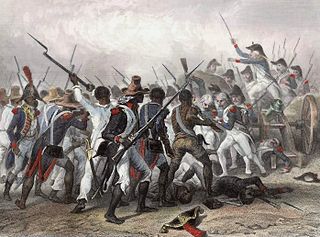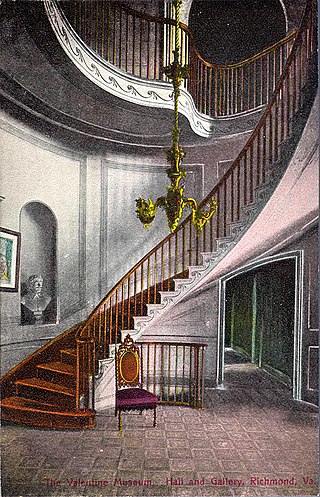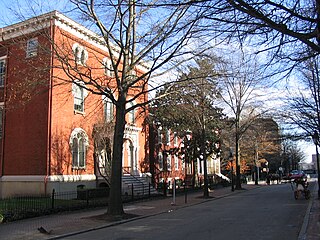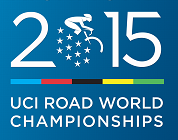
Richmond is the capital city of the Commonwealth of Virginia in the United States. Incorporated in 1742, Richmond has been an independent city since 1871. The city's population in the 2020 census was 226,610, up from 204,214 in 2010, making it Virginia's fourth-most populous city. The Richmond metropolitan area, with over 1.3 million residents, is the Commonwealth's third-most populous.

Lynchburg is an independent city in the Commonwealth of Virginia in the United States. First settled in 1757 by ferry owner John Lynch, the city's population was 79,009 at the 2020 census, making Lynchburg the 11th most populous city in Virginia. Located in the foothills of the Blue Ridge Mountains along the banks of the James River, Lynchburg is known as the "City of Seven Hills" or the "Hill City". In the 1860s, Lynchburg was the only city in Virginia that was not recaptured by the Union before the end of the American Civil War.

Gabriel's Rebellion was a planned slave rebellion in the Richmond, Virginia, area in the summer of 1800. Information regarding the revolt was leaked before its execution, and Gabriel, an enslaved blacksmith who planned the event, and twenty-five of his followers were hanged.
In United States law, the Establishment Clause of the First Amendment to the United States Constitution, together with that Amendment's Free Exercise Clause, form the constitutional right of freedom of religion. The Establishment Clause and the Free Exercise Clause together read:
Congress shall make no law respecting an establishment of religion, or prohibiting the free exercise thereof...

The history of Richmond, Virginia, as a modern city, dates to the early 17th century, and is crucial to the development of the colony of Virginia, the American Revolutionary War, and the Civil War. After Reconstruction, Richmond's location at the falls of the James River helped it develop a diversified economy and become a land transportation hub.
The Greater Richmond, Virginia area has many neighborhoods and districts.

The Virginia Statute for Religious Freedom was drafted in 1777 by Thomas Jefferson in Fredericksburg, Virginia, and introduced into the Virginia General Assembly in Richmond in 1779. On January 16, 1786, the Assembly enacted the statute into the state's law. The statute disestablished the Church of England in Virginia and guaranteed freedom of religion to people of all religious faiths, including Christians of all denominations, Jews, Muslims, and Hindus. The statute was a notable precursor of the Establishment Clause and Free Exercise Clause of the First Amendment to the United States Constitution.
Religious Freedom Day commemorates the Virginia General Assembly's adoption of Thomas Jefferson's landmark Virginia Statute for Religious Freedom on January 16, 1786. The statute, written by Jefferson in 1777 and shepherded through the legislature by James Madison in 1786, became the basis for the establishment clause of the First Amendment of the U.S. Constitution and led to freedom of religion for all Americans.

Downtown Richmond is the central business district of Richmond, Virginia, United States. It is generally defined as being bound by Belvidere Street to the west, I-95 to the north and east, and the James River to the south. The Fan district borders it to the west, Highland Park to the north, Church Hill to the east, and Manchester to the south.

Shockoe Hill is one of several hills on which much of the oldest portion of the City of Richmond, Virginia, U.S., was built. It extends from the downtown area, including where the Virginia State Capitol complex sits, north almost a mile to a point where the hill falls off sharply to the winding path of Shockoe Creek. Interstate 95 now bisects the hill, separating the highly urbanized downtown portion from the more residential northern portion.

The Valentine is a museum in Richmond, Virginia dedicated to collecting, preserving and interpreting Richmond's history. Founded by Mann S. Valentine II 1898, it was the first museum in Richmond.

Shockoe Slip is a district in the downtown area of Richmond, Virginia. The name "slip" referred to a narrow passageway leading from Main Street to where goods were loaded and unloaded from the former James River and Kanawha Canal. The rough boundaries of Shockoe Slip include 14th Street, Main Street, Canal Street and 12th Street.

Court End is a neighborhood in Richmond, Virginia, that sits to the north of the Capitol Square and East Broad Street. It developed in the Federal era, after Virginia's capital moved from Williamsburg.

The Baptist Joint Committee for Religious Liberty (BJC) is a US faith-based organization which focuses on upholding the historic Baptist principle of religious liberty.

The 2015 UCI Road World Championships took place in Richmond, Virginia, United States from September 19–27, 2015. It was the 88th Road World Championships. Peter Sagan won the men's road race and Lizzie Armitstead won the women's road race.

The Richmond Theatre fire occurred in Richmond, Virginia, United States, on Thursday, December 26, 1811. It devastated the Richmond Theatre, located on the north side of Broad Street between what is now Twelfth and College Streets. The fire killed 72 people, including Virginia's governor George William Smith, former U.S. senator Abraham B. Venable, and other government officials in what was the worst urban disaster in U.S. history at the time. The Monumental Church was erected on the site as a memorial to the fire.
The following is a timeline of the history of the city of Richmond, Virginia, United States
James Brent Walker is the former Executive Director of the Baptist Joint Committee for Religious Liberty, a leading church-state advocacy group. He holds professional designations as a member of the Bar of the Supreme Court of the United States and an ordained Baptist minister. After retirement from the BJC, he served as Interim President of the John Leland Center for Theological Studies in Arlington, Virginia, until the end of 2018.
The Shockoe Bottom African Burial Ground, known historically as the "Burial Ground for Negroes" and the "old Powder Magazine ground", is the older of two municipal burial grounds established for the interment of free people of color and the enslaved in the city of Richmond, Virginia. It is located at 1554 E Broad St., across from the site of Lumpkin's Jail, in Shockoe Bottom. The area now known as Shockoe Bottom, was historically known as Shockoe Valley. Richmond's second African Burial Ground, called the Shockoe Hill African Burying Ground is the larger of the two burial grounds, and is located a mile and a half away at 1305 N 5th St, on Shockoe Hill.

There are an estimated 200,000 Muslims in Virginia in the United States as of 2008, according to the American Religious Identification Survey. As of 2014, Virginia has the fourth highest Islamic population concentration in the United States.














